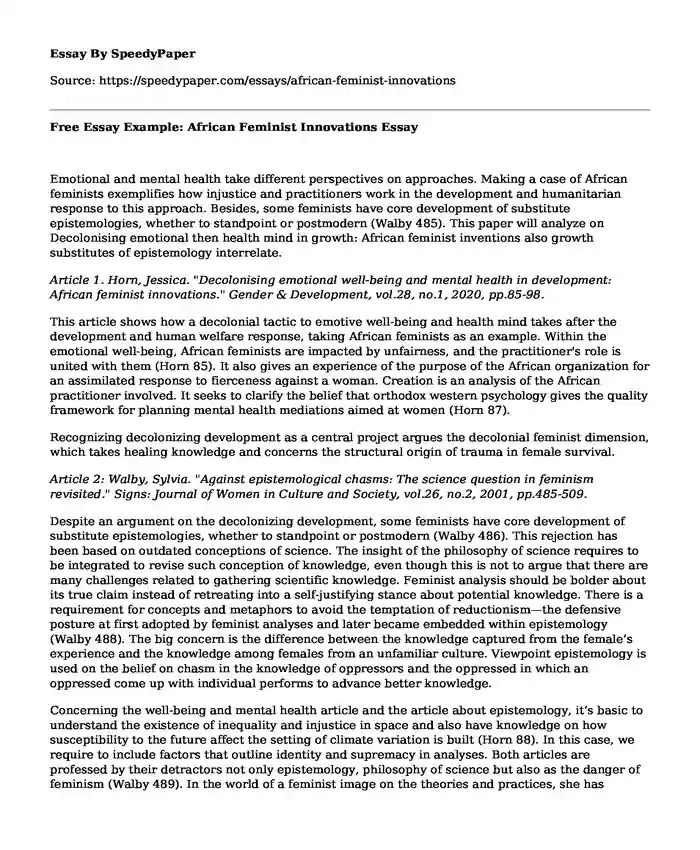
| Type of paper: | Essay |
| Categories: | Women Feminism World Literature review |
| Pages: | 3 |
| Wordcount: | 689 words |
Emotional and mental health take different perspectives on approaches. Making a case of African feminists exemplifies how injustice and practitioners work in the development and humanitarian response to this approach. Besides, some feminists have core development of substitute epistemologies, whether to standpoint or postmodern (Walby 485). This paper will analyze on Decolonising emotional then health mind in growth: African feminist inventions also growth substitutes of epistemology interrelate.
Article 1. Horn, Jessica. "Decolonising emotional well-being and mental health in development: African feminist innovations." Gender & Development, vol.28, no.1, 2020, pp.85-98.
This article shows how a decolonial tactic to emotive well-being and health mind takes after the development and human welfare response, taking African feminists as an example. Within the emotional well-being, African feminists are impacted by unfairness, and the practitioner's role is united with them (Horn 85). It also gives an experience of the purpose of the African organization for an assimilated response to fierceness against a woman. Creation is an analysis of the African practitioner involved. It seeks to clarify the belief that orthodox western psychology gives the quality framework for planning mental health mediations aimed at women (Horn 87).
Recognizing decolonizing development as a central project argues the decolonial feminist dimension, which takes healing knowledge and concerns the structural origin of trauma in female survival.
Article 2: Walby, Sylvia. "Against epistemological chasms: The science question in feminism revisited." Signs: Journal of Women in Culture and Society, vol.26, no.2, 2001, pp.485-509.
Despite an argument on the decolonizing development, some feminists have core development of substitute epistemologies, whether to standpoint or postmodern (Walby 486). This rejection has been based on outdated conceptions of science. The insight of the philosophy of science requires to be integrated to revise such conception of knowledge, even though this is not to argue that there are many challenges related to gathering scientific knowledge. Feminist analysis should be bolder about its true claim instead of retreating into a self-justifying stance about potential knowledge. There is a requirement for concepts and metaphors to avoid the temptation of reductionism—the defensive posture at first adopted by feminist analyses and later became embedded within epistemology (Walby 488). The big concern is the difference between the knowledge captured from the female’s experience and the knowledge among females from an unfamiliar culture. Viewpoint epistemology is used on the belief on chasm in the knowledge of oppressors and the oppressed in which an oppressed come up with individual performs to advance better knowledge.
Concerning the well-being and mental health article and the article about epistemology, it’s basic to understand the existence of inequality and injustice in space and also have knowledge on how susceptibility to the future affect the setting of climate variation is built (Horn 88). In this case, we require to include factors that outline identity and supremacy in analyses. Both articles are professed by their detractors not only epistemology, philosophy of science but also as the danger of feminism (Walby 489). In the world of a feminist image on the theories and practices, she has managed to attain some distinctions.
Despite believing the females are underprivileged by the domination of unilinear reasonableness in both production of knowledge and assessment of its producers, we do not have common Harding’s feminist viewpoint epistemology (Walby 495). Besides, there are quite a several arguments against a commitment of truth, such as the argument that an appropriate modestly against the justificatory status of our beliefs implies the refusal to endorse the content of those beliefs when it’s contrasted.
Conclusion
Some postmodern feminists have cautioned about the dangers of generalization in feminist philosophy that transcend the boundaries of culture. Also, feminist critics of postmodernism have argued that leaving cross-cultural may lead to relativism. Furthermore, the articles are aging on the importance of embracing the idea of secondhand beside that of trauma.
Work Cited
Horn, Jessica. "Decolonising emotional well-being and mental health in development: African feminist innovations." Gender & Development 28.1 (2020): 85-98. https://www.tandfonline.com/doi/abs/10.1080/13552074.2020.1717177
Walby, Sylvia. "Against epistemological chasms: The science question in feminism revisited." Signs: Journal of Women in Culture and Society 26.2 (2001): 485-509. https://www.journals.uchicago.edu/doi/abs/10.1086/495601?journalCode=signs
Cite this page
Free Essay Example: African Feminist Innovations. (2023, Nov 03). Retrieved from https://speedypaper.com/essays/african-feminist-innovations
Request Removal
If you are the original author of this essay and no longer wish to have it published on the SpeedyPaper website, please click below to request its removal:
- A Moment Remembered - Personal Essay Sample
- Free Essay Example on Employee Empowerment
- Free Essay on the HR Department
- Creation of an Enabling Environment - Free Essay on Inclusion and Diversity
- Essay Example: How I Have Come to Be Who I Am
- Free Essay: Collaborative Initiative
- Report Example on Borders Explored: Unintended Consequences of U.S. Immigration Policies
Popular categories




